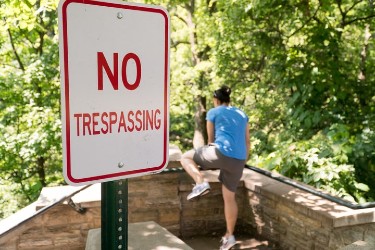 Nebraska landowners take their property rights seriously. After a harmless prank, you may find yourself facing trespassing charges.
Nebraska landowners take their property rights seriously. After a harmless prank, you may find yourself facing trespassing charges.
Criminal trespass charges might apply any time you’re on someone’s property without permission.
If you face trespassing charges, you need an experienced criminal defense attorney. You don’t want these charges on your criminal record.
Attorney Thomas Petersen at Petersen Criminal Law can help. Tom has represented thousands of clients who face criminal charges.
If you want to know how to get a trespassing charge dropped, contact our attorney, Thomas Petersen, today. He uses his extensive knowledge of Nebraska law to try to get your charges reduced or dismissed.
Contact a criminal defense attorney for a free consultation, where you can discuss your trespassing charge and legal options. To learn more about Nebraska trespassing laws, keep reading.
What Are Trespassing Laws in Nebraska?
Nebraska law divides criminal trespass into two categories, first and second degree, depending on the circumstances of the trespass.
Criminal Trespass 1st-Degree
A person commits criminal trespass 1st-degree if they:
- Enter or secretly remain in any building, occupied structure, or separately secured portion of a building; and
- Know that they do not have permission to be in the building or structure.
It is also criminal trespass 1st-degree to enter a power plant or electrical station without an authority’s consent.
These charges apply even if you have permission to be in a portion of a building but enter an unauthorized portion of the building. For instance, you might have permission to be in a retail store.
However, if you sneak into the manager’s office, you could face 1st-degree criminal trespass charges.
Criminal Trespass 2nd-Degree
A person commits criminal trespass 2nd-Degree if they enter or remain in any place after they know that they do not have permission to be in the place and
- Receive communication that forbids trespass;
- See a “No Trespassing” sign or other posting forbidding trespass; or
- Encounter fencing or another enclosure designed to exclude intruders.
You might not see a “No Trespassing” sign on the property. Nonetheless, if the sign was placed in a position visible to the public, your defense of lack of knowledge might not work.
A skilled criminal defense attorney can help you present your best defense against criminal trespass 2nd-degree charges.
What Are Nebraska Trespassing Penalties?
First-degree criminal trespass is a Class I misdemeanor, punishable by:
- Up to a year in jail, and
- Up to a $1,000 fine.
Second-degree criminal trespass is a Class III misdemeanor, punishable by:
- Up to three months in jail, and
- Up to a $500 fine.
If a property owner orders a person to leave and they defy that order, second-degree criminal trespass penalties increase.
In that situation, second-degree criminal trespass is a Class II misdemeanor, punishable by:
- Up to six months in jail, and
- Up to a $1,000 fine.
The specific factors in your trespass charge will determine which penalty applies. A criminal defense attorney can try to get your trespass charge reduced or dismissed.
Defenses to Trespass
Your Nebraska criminal defense attorney can present several defenses to trespass:
- You had the owner’s permission to be on the property,
- The building was abandoned,
- The property was open to the public,
- You did not know you were on someone’s property without permission, and
- You were on the person’s property in an emergency.
The criminal burden of proof is beyond a reasonable doubt. That means that the prosecution has to prove each element of your trespassing charge.
However, your criminal defense attorney only has to cast doubt in the judge or jury’s mind about one element for you to receive an acquittal.
Contact a Nebraska Criminal Defense Lawyer Today
If you need legal advice about your Omaha criminal trespassing charge, call Attorney Tom Petersen. At Petersen Criminal Law, Tom Petersen represents thousands of criminal defendants.
He doesn’t want to judge you or lecture you. He wants to defend you to try to preserve your freedom and finances.
Contact Tom for a free consultation today, and start defending yourself against a criminal trespass charge.


